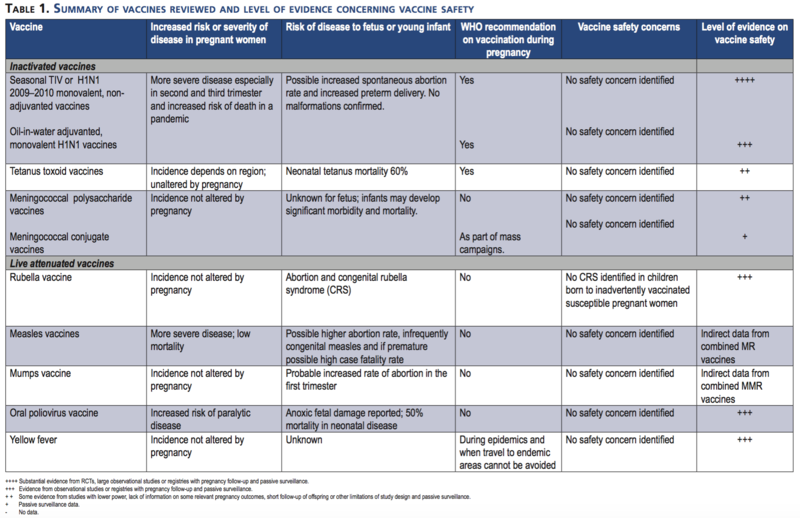FA16 Immunization Module’s Updates
Vaccinating pregnant women
The importance of receiving certain vaccines during pregnancy has become well established. Because the adaptive immune systems of neonates and premature infants is not developed, they are particularly vulnerable to morbidity and mortality at the time of birth. Vaccinations received during pregnancy can protect mothers against vaccine-preventable infections. In doing so, vaccines also have the potential to protect the fetus. Moreover, these vaccinations can directly protect the fetus and infant via maternal antibodies that are transferred to the fetus and provide passive immunization. (1)
Currently, doctors primarily recommend 2 vaccines: the flu (influenza) vaccine, which doctors recommend receiving during the first or second trimester of pregnancy; and the Tdap (tetanus-diphtheria-acellular pertussis) vaccine, which doctors recommend receiving sometime between the 27th and 36th week of pregnancy. The flu vaccine is important to receive during pregnancy because pregnant women are seven times more likely than non-pregnant women of the same age to contract a severe or fatal case of the flu. The Tdap vaccine, which guards against whooping cough (pertussis), is important to receive during pregnancy because of the high rate of deaths among babies under 2 months caused by whooping cough (2). Both of these vaccines are inactivated vaccines, which are considered safe. This is because immunization with inactivated vaccines or toxoids during pregnancy is not expected to be associated with any increased risk to the fetus (1).
On the other hand, doctors recommend that pregnant women not get vaccines that use live, attenuated (weakened) viruses, such as the MMR (measles, mumps, rubella) and chicken pox vaccines (2). The theoretic risk posed by live attenuated virus vaccines is that the live attenuated viruses might be able to cross the placenta and infect the fetus (1). Due to this potential risk, live attenuated vaccines are generally contraindicated or not recommended during pregnancy. However, as a result of mass vaccination campaigns, which utilize live attenuated viral vaccines, there have been reports of inadvertent vaccination of pregnant women (1).
Available data from studies following inadvertent vaccination of pregnant women have begun to shed light on the relative safety of live attenuated vaccines. This data is particularly important in situations where vaccination of pregnant women is contraindicated based on solely precautionary grounds. Current evidence demonstrates the safety of certain live attenuated vaccines including monovalent rubella vaccines, combined measles-mumps-rubella vaccines, yellow fever and oral poliovirus vaccines. Current literature on the matter demonstrates that no significant adverse effects on the fetus have been reported following administration of these live attenuated vaccines. (1)
It should be noted, however, that existing evidence on the matter is limited due to several reasons. Clinical trials do not usually include pregnant or lactating women. As a result, pregnant women are not included in pre-licensing clinical trials and there is limited post-licensing data on pregnant women. (1) Because of the importance of vaccinations received during pregnancy and the use of live attenuated viral vaccines in mass vaccination campaigns, further research is needed on the use and safety of live attenuated vaccines.
Included is a table published in the WHO (World Health Organization) report on relevant literature on the safety of vaccination of pregnant women published in 2014. The table summarizes vaccines reviewed and the level of evidence concerning vaccine safety. (1)
1. http://www.who.int/vaccine_safety/publications/safety_pregnancy_nov2014.pdf
2. http://www.babycenter.com/404_is-it-safe-to-get-vaccinated-during-pregnancy_9541.bc



After doing my update on live vs. inactivated vaccines, I really liked hearing how each relates to women during pregnancy. Because inactivated vaccinations are safer, I understand why pregnant women should receive these rather than live vaccines. I do wonder though if pregnant women with little access to health care would be best treated through inactivated vaccines due to the fact they have to come in for multiple doses instead of just one or two.